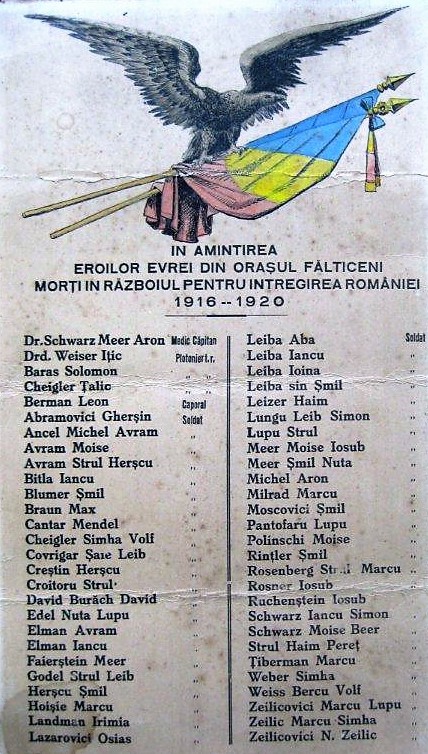
The service of the Jews in the Romanian army was linked closely to the struggle for emancipation. The compulsory enlistment law, passed on June 11, 1864, required the enlistment of Romanians and stateless foreigners (only Jews were found in this category). Jews were therefore obliged to enlist, even though they had no civil rights and were recruited as "foreign residents under no foreign protection".
In 1877, when Romania joined Russia in the war against Turkey and fought for independence, Jews were drafted for the first time into the army, and out of the 80,000 soldiers who were recruited there were about one thousand Jews; 120 of them fell in battles in Plevna.
Despite the participation of the Jews in the fighting, there was no change in the civil status of the Jews of Romania, and apart from the 888 soldiers who took part in the fighting and were granted citizenship under special law, all requests of Romanian Jews for citizenship were rejected. In the first and second Balkan wars between 1912 and 1913, some 13,000 Jewish soldiers took part, but this time even the soldiers who took part in the war were not granted citizenship.
With the beginning of World War I, the question of the citizenship of Jews called to serve in the army rose again. In 1916, after a period of neutrality, Romania decided to join the "Allied Powers", whereby 23,000 Jews were recruited into the Romanian army, about a tenth of the Romanian Jews at the time. Romania was defeated in the war and suffered heavy losses. More than half of its territory, including Muntenia, the capital city of Bucharest; Dobruja (Dobrogia), with its outlet to the sea, and southern Moldavia were conquered by the enemy, with about one million Romanians killed on the front or starved to death.
Of the Jews recruited, 882 were killed, 772 wounded, 449 taken prisoners of war and 3,043 listed as missing. 825 Jewish soldiers received medals for excellence due to heroism in the battlefield, including 220 doctors and paramedics. The massive participation of Jews in the Romanian army during the World War I did not diminish anti-Semitic hostility, and many Jewish soldiers had been accused of "treason", "espionage", and "using the Yiddish language at the front", and 150 were sentenced to death.
On December 4, 1918, a meeting took place between Prime Minister Ion Brătianu and three representatives of the Local Jewish Union; Wilhelm Filderman, Meyerson and Ettinger. The three requested to give Brătianu a memorandum about violence against the Jewish population and to discuss with him the granting of citizenship to Romanian Jews. Brătianu tried to postpone dealing with the issue of Jewish citizenship by linking citizenship and agrarian reform. When Filderman asked him not to postpone the granting of citizenship, Brătianu replied that he could not appeal to the state with such a demand, adding, "You know that the country is anti-Semitic". Filderman then replied that anti-Semitism is not the anti-Semitism of the people; it is spread from above, and that "one of the tasks of army leadership during the war was to poison the atmosphere with regard to the Jews. For the military defeats and the disasters in this country, only we are responsible, traitors, rebels, are just between us".
Romanian military authorities continued this anti-Semitic policy toward Jewish soldiers until the 1930s, with occasionally things reaching absurd proportions. For example, a Jewish soldier was charged with desertion and tried before a military court without his presence. During the trial it was proven by testimonies of Romanian soldiers who fought alongside the defendant that he had fallen on the battlefield as a hero.
But despite anti-Semitism, the Jews continued to serve in the army and enjoyed relative stability. In the general mobilization of 1938, when King Carol II rejected the German proposals for cooperation, and in response to Hitler's threats, he announced a general mobilization of the reserve forces. The Jews responded to the call and about 60,000 soldiers enlisted. The last time the Jews were called to enlist was in 1940, on the eve of the annexation of Serbia and Bukovina to the Soviet Union.
In August 1940, anti-Semitism reached its peak in Romania, and King Carol II issued an order to expel all Jews from the Romanian army. Thus ending 76 years in which the Jews had served in the army from the beginning of Romania as a unified country, (Greater Romania), until it entered World War II.